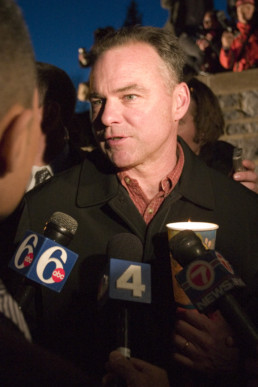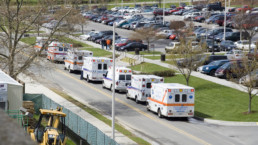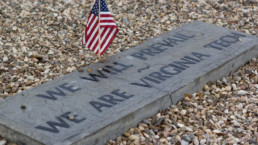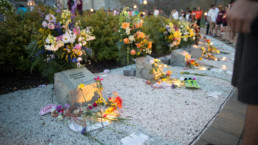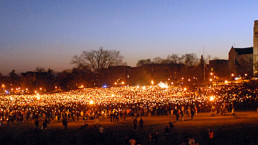Sen. Tim Kaine sounded particularly serious as he welcomed reporters from the Collegiate Times into his office on Thursday, March 30, in the Russell Senate Building. The mood in the junior senator’s office matched that of the rest of Capitol Hill — businesslike and reserved.
This was not an ordinary press interview for Kaine. During his term that stretched from 2006–10, Kaine was governor of Virginia when the worst mass shooting at that point in U.S. history took place on Virginia Tech’s campus on April 16, 2007 — which he vividly remembers.
Ten years later, Kaine remains changed by his time spent in Blacksburg during the aftermath of the massacre. “As you can expect, this is a very emotional thing for the Senator to talk about, so everyone should be prepared for that,” wrote Press Secretary Miryam Lipper in an email to the Collegiate Times prior to the interview.
THE IMMEDIATE AFTERMATH
Kaine and his wife Anne Holton heard a sharp knock on their hotel room door late at night on Sunday, April 15. They had traveled to Japan that day for an economic development trip with 150 Virginia businesses and had eaten dinner and turned in after a long day of traveling. Ron Watkins, the head of the then-governor’s security detail, informed Kaine that there was a mass shooting underway in Virginia (where it was Monday morning), and that he should call his chief of staff for more details.
After calling his chief of staff and watching coverage of the shooting on CNN, Kaine’s staff booked the earliest flight back to Dulles Airport in Washington, D.C., the next morning. After landing at Dulles Airport, Kaine and Holton met then-President George W. Bush and First Lady Laura Bush at Andrews Air Force Base and flew to Blacksburg.
Once in Blacksburg, the two executives and first ladies visited with the families of victims in Cassell Coliseum.
After this, Kaine described a gathering in an auditorium of the Virginia Tech community and some special guests: “Others had come too, which was really remarkable. The entire Virginia federal legislative delegation — two senators, members of Congress — had all flown down.”
Kaine described the powerful speeches that were given at this gathering in an effort to offer comfort to a grieving community.
“Nikki Giovanni was really powerful and President Bush was really, really gracious,” Kaine said. He then contrasted these speeches to his own, which he felt were hurt by his rigorous travel. “I was extremely jetlagged because of flying between and flying back, and had just thought about some things to say when I was on the plane coming back.”
Gov. Tim Kaine took only one or two questions at the candlelight vigil held on Tuesday, April 17, 2007, to remember victims of the tragedy.
Senator Tim Kaine
Sen. Tim Kaine speaks about his experience on April 16, 2007.
MOVING FORWARD
Following meetings with Virginia Tech faculty to discuss the shooting, Kaine and Holton spent the night at The Grove, the residence for the university president. Kaine described Charles Steger, who was president of the university at the time, as “a very, very dear friend.”
Kaine and Steger sat down that night and discussed what their next steps should be.
“By the end of the day, I had decided that we needed to appoint a panel to investigate everything that had happened, what had gone wrong, what we could fix, how we could reduce the chance of this ever happening again, not only in Virginia, but anywhere,” Kaine explained.
After creating a panel, Kaine decided that this panel should be completely independent of the university and people impacted by the tragedy — a decision that would create controversy at the time.
“The panel needed to be all people who had either no tie with the families and no tie with Virginia Tech,” Kaine said. “I got some pushback on both ends of that, there were some who felt like folks with Virginia Tech ties should be involved, and there were definitely family members who wanted family members to participate on the panel, but I felt like the right panel would be one that could just ask really tough questions and be as candid as could be.”
ALL TOO FAMILIAR: The Sandy Hook and Orlando shootings
Kaine is discouraged that there have been so many similar tragedies since the shooting at Virginia Tech.
“I’ve always … hoped that there would never be a worse shooting tragedy (than) at Virginia Tech. You don’t want that for your school, you don’t want that for your commonwealth, but I desperately wanted there to never be a shooting that would be as egregious.”
Unfortunately, mass shootings continue to rage throughout the country, and Orlando’s Pulse nightclub was one of the most recent to fall victim to this epidemic. As a vice presidential candidate, Kaine visited the site.
“I hoped I would never go to a site of a shooting that had been worse because what that meant is we didn’t learn anything, and violence has continued and it’s gotten worse, and so that was emotional to see that and think, ‘Wow, we really haven’t learned anything,’” Kaine said.
Sen. Tim Kaine reflects on gun violence in America.
KAINE'S TAKE ON THE NATIONAL RIFLE ASSOCIATION (NRA) AND FEDERAL BUDGET
Kaine believes that over time, the NRA has switched its allegiance from gun owners to gun manufacturers.
“The NRA does have some political power, and I think they’re not as powerful as a lot of folks do, but they have political power,” Kaine said. “The members of Congress aren’t listening to voters because they’re afraid of the organization.”
Throughout the interview, Kaine reiterated that he is a gun owner and a supporter of the Second Amendment. However, Kaine has perennially received an “F” rating from the NRA.
“I’ve worked on projects that they’ve liked, like Project Exile, which was a project in Richmond when I was mayor that brought down gun violence,” Kaine said. The 1997 program was aimed at lowering crime rates by turning gun offenses to the federal court system.
Currently, Kaine is dealing with a proposed budget that would slash federal healthcare spending, including funds previously allocated for mental health.
“I think it’s ridiculous and I’m going to spend time fighting against that,” Kaine explained. “I get that in any budget decision, somebody’s made a compelling argument for something else, but spending less and less money on mental health is no way to go.”
.@timkaine: Perennially “F” rated by the #NRA during his tenure at both the state and federal levels... https://t.co/JNIkoyUvxS #VPDebate
— NRA (@NRA) October 5, 2016
And proud of it. https://t.co/eTkYtcuAw4
— Senator Tim Kaine (@timkaine) October 5, 2016
Sen. Tim Kaine speaks with reporters from the Collegiate Times in his office in the Russell Senate Building about his experience as governor of Virginia during the April 16 shootings, March 30, 2017.ZACK WAJSGRAS / COLLEGIATE TIMES
YEARS IN THE SENATE
Kaine was elected to the Senate in 2012 and has since worked to support reasonable gun safety measures.
Regarding an increase in gun safety measures, he continues to be optimistic.
“I think we will (take meaningful steps forward) because I’m not aware of any situation where the American public has been overwhelmingly in one place and Congress refuses to listen for a long time,” Kaine said. “Sometimes it takes Congress a while to listen, but there’s not a permanent issue where Congress has refused to listen to the American public on an issue like background record checks.”
In pursuit of preventing gun violence, Kaine supports curtailing gun accessories. “I support a restriction on high-capacity magazines that tend to get used in these crimes to just kill tons of people, and I don’t think they have any real use beyond carnage.”
He is additionally a strong advocate for background checks. “When you don’t have a background check system, you’re basically saying I’d rather have felons buy guns and committing crimes with them than enforce the law that says a felon shouldn’t be able to buy a gun,” Kaine said.
According to the Toronto Star, Seung-Hui Cho, who killed 32 people and then himself during the shooting, was able to buy a 9mm Glock 19 pistol and 50 rounds of ammunition in one transaction, and a .22-calibre Walther in another.
However, the Roanoke Times found that in 2005, “a Virginia court branded Cho as a danger to himself and ordered him to receive outpatient psychiatric treatment, which he did not. Under federal law, that 2005 order meant Cho was not legally authorized to buy either guns or ammunition.”
On March 12, 2007, Cho purchased a gun and ammunition from Roanoke Firearms. His pre-purchase background check lasted about a minute.
Ten years later, Kaine remembers the victims of the shooting.
“To me, that’s always going to be the thing that I think most about because the people who were killed were students of all kinds of backgrounds, from communities 10 miles away from Blacksburg and from communities halfway around the world. Undergraduates, graduate students, teachers — French teacher, engineering teacher, German teachers, teachers of the year at Blacksburg, world renowned scholars in certain areas,” Kaine explained.
Kaine identified the story of Professor Liviu Librescu, who was killed by the shooting, as an example of how far the U.S. has to come in preventing gun violence.
“The person I always think about, because in some ways his example is the most sort of challenging to us, is Professor Liviu Librescu, who was Romanian born, Holocaust survivor, survived the Soviet Union’s takeover of his country where he was getting frozen out because he was a Jew … He basically had his teaching privileges successively reduced and eliminated, and then he was allowed to emigrate to Israel. At some point when he was teaching at Hebrew University in Israel, he came to Tech for a one-year teaching fellowship, fell in love with Blacksburg and then stayed for many years. He was teaching at 75 years old.
“It’s kind of haunting that someone who could survive the Holocaust and could survive the Soviet Union taking over his country, couldn’t survive this carnage of gun violence in the United States. I feel like in some ways that lesson is maybe one of the more powerful ones,” Kaine said.
Kaine finally called on other elected officials to see beyond party-line pressures.
“All of us in this job every day, we’ve got to remind ourselves that we’re put here not just because of our head, but also because of our heart and maybe especially because of our backbone.”

